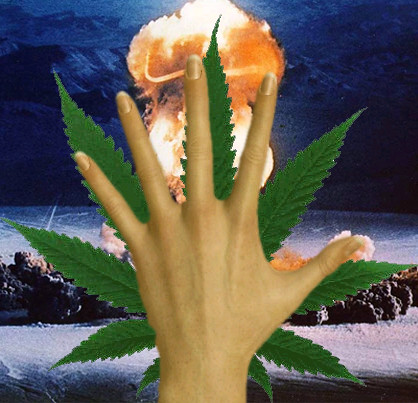 "Marijuana potency increased last year to the highest level in more than 30 years, posing greater health risks to people who may view the drug as harmless, a new US report says.
"Marijuana potency increased last year to the highest level in more than 30 years, posing greater health risks to people who may view the drug as harmless, a new US report says.
The latest analysis from the University of Mississippi's Potency Monitoring Project tracked the average amount of THC, the psychoactive ingredient in marijuana, in samples seized by law enforcement agencies from 1975 to 2007. It found that the average amount of THC reached 9.6 per cent last year, compared with 8.75 per cent in 2006".
Source: http://www.smh.com.au/news/science/drug-potency-doubles/2008/06/12/1212863811747.html
The rise in THC levels is hardly surprising. For years police have been targeting marijuana plantations, of both the backyard and commercial variety. This kind of bust has always been a soft target due to the high visibility of crops and improvements in aerial surveillance. It has forced growers to abandon outdoor crops in favour of indoor, hydroponics. Under controlled indoor conditions, marijuana can develop much higher potency. Higher potency levels can contribute to psychological, cognitive and respiratory problems. The problem seems to lie more with the law than with the use of marijuana itself.
Just what is the so called ‘war on drugs’ about? Every year, countless billions of tax payers money is spent on drug enforcement. Countless people end up in prison or worse in some countries for choosing to ingest prohibited substances. Is this expense justified? Why are crimes involving drugs given a higher priority than most others when this is essentially a victimless crime?
Governments and law enforcement agencies might warn that if the prohibited substances in question were legalised social disorder would quickly ensue. They worry they would lose control over large sections of the community, and being in control is always of prime concern.
However, the fact that recreational drugs is illegal does little to discourage their use and somehow society does not come crashing down around our heads. They might argue that if drugs were legal, people would be constantly off their heads and unable to be productive members of society. It is possible to sit down in the gutter with a bottle of scotch but the fact is, most people just don’t. Of course, any drug can be abused, but there have always been a much higher incidence of health problems related to legal drugs like alcohol and tobacco than illegal drugs. Persecuting those who insist on taking drugs has done nothing to solve the problem; in fact it only makes things worse.
Tenaciously targeting soft targets like marijuana does make it difficult to buy, and this increases it’s price. This is very welcome to organised criminals dealing drugs. It makes marijuana sales ever more lucrative and makes buyers with less money much more likely to try cheaper alternatives like heroin. The addictive nature of heroin and narcotics means customers are all the more likely to keep coming back for more; again the dealers profit. The deadly nature of heroin is caused by varying levels of imputy; it might be cut with sugar one week and cement the next. No one knows what they are getting when they buy on the street and addicts frequently die. Another argument often cited is that relaxation of drug laws could make drugs more available to children; but couldn’t age restrictions be applied more easily if the drugs weren’t illegal? As things are there are no restrictions.
Farmers are now being encouraged by many governments to grow non drug producing marijuana. This plant produces the strongest known natural fibre and has an incredibly high yield. It also has other health related benefits and has been used to treat conditions like glaucoma. Perhaps such things are signals that the laws need to be rethought.
The ‘war on drugs’ has been described by some as a modern day version of prohibition. Prohibition failed dramatically and did little more than lead to a rise in organised crime. The war on drugs is little different. Criminals get rich and users suffer. It is more a war on freedom than anything else.
Sunday, July 27, 2008
The war on drugs
Labels:
marijuana law reform,
prohibition,
THC levels,
war on drugs
Subscribe to:
Post Comments (Atom)



No comments:
Post a Comment